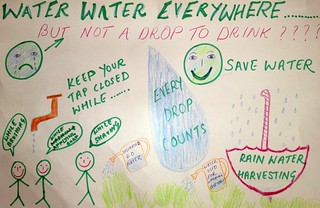I've been helping Indian teachers plan projects for their students, and not surprisingly, many of these focus on solving environmental challenges. Scarce water, plastic waste everywhere, bad air, no place to play, all of these issues affect the lives and health of Indian kids. Teachers' projects tend to focus on the capacity of the individual to make a difference. I guess I'm pessimistic-- with such huge problems intense collective action is required. I wonder if instead of personal action projects and awareness campaigns students should practice collective action that has a concrete and measurable result. A result they can reflect on later and think, I was part of something that made a difference and I can keep operating this way. Still muddling over this shift and how to talk about it with teachers. Any thoughts?





